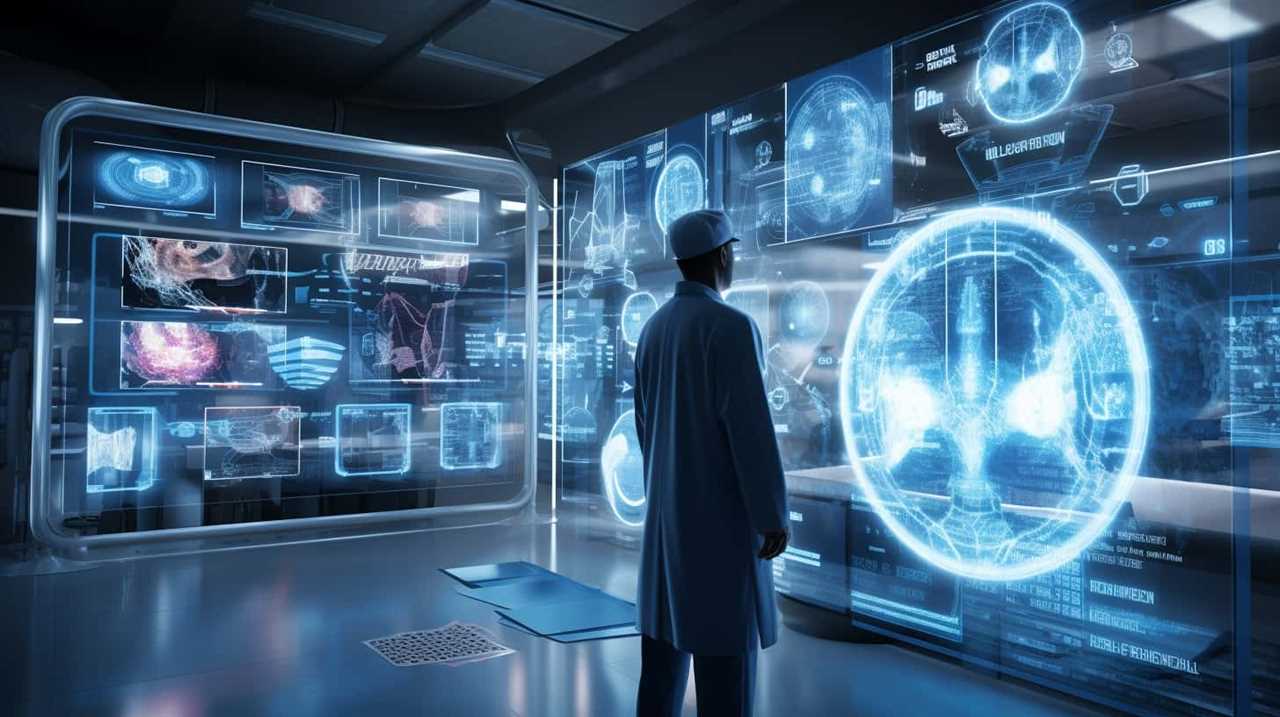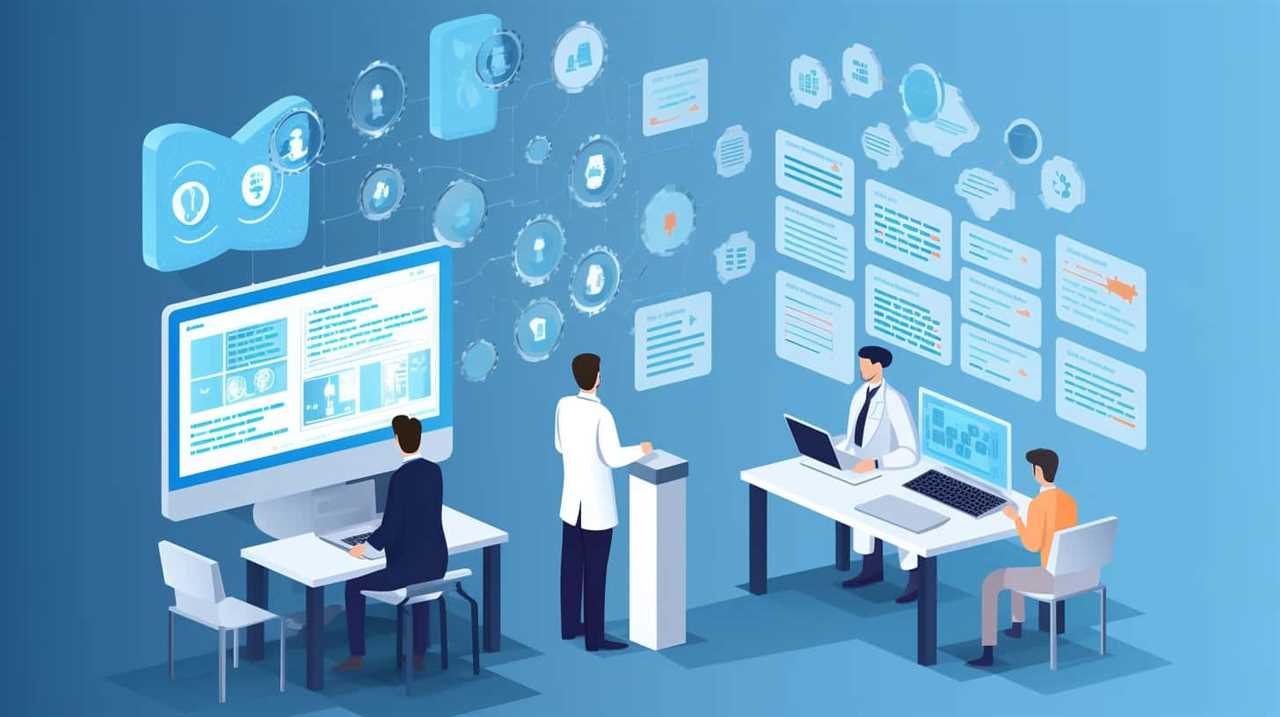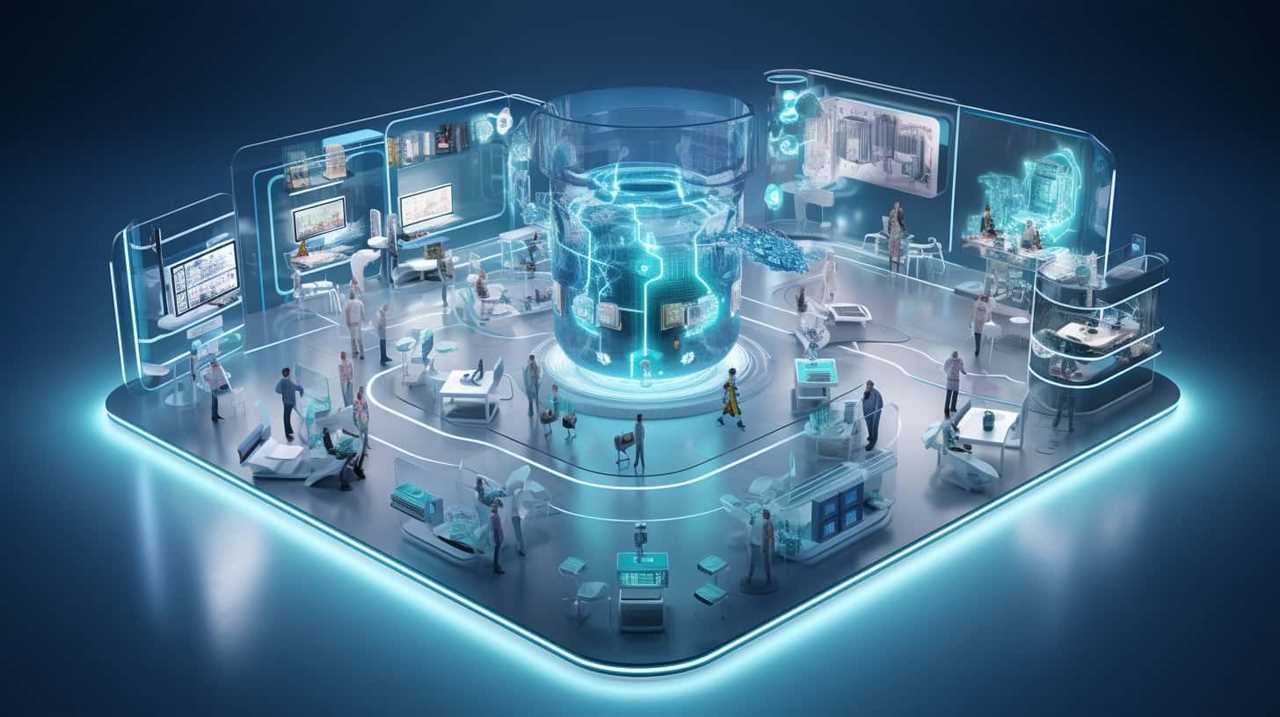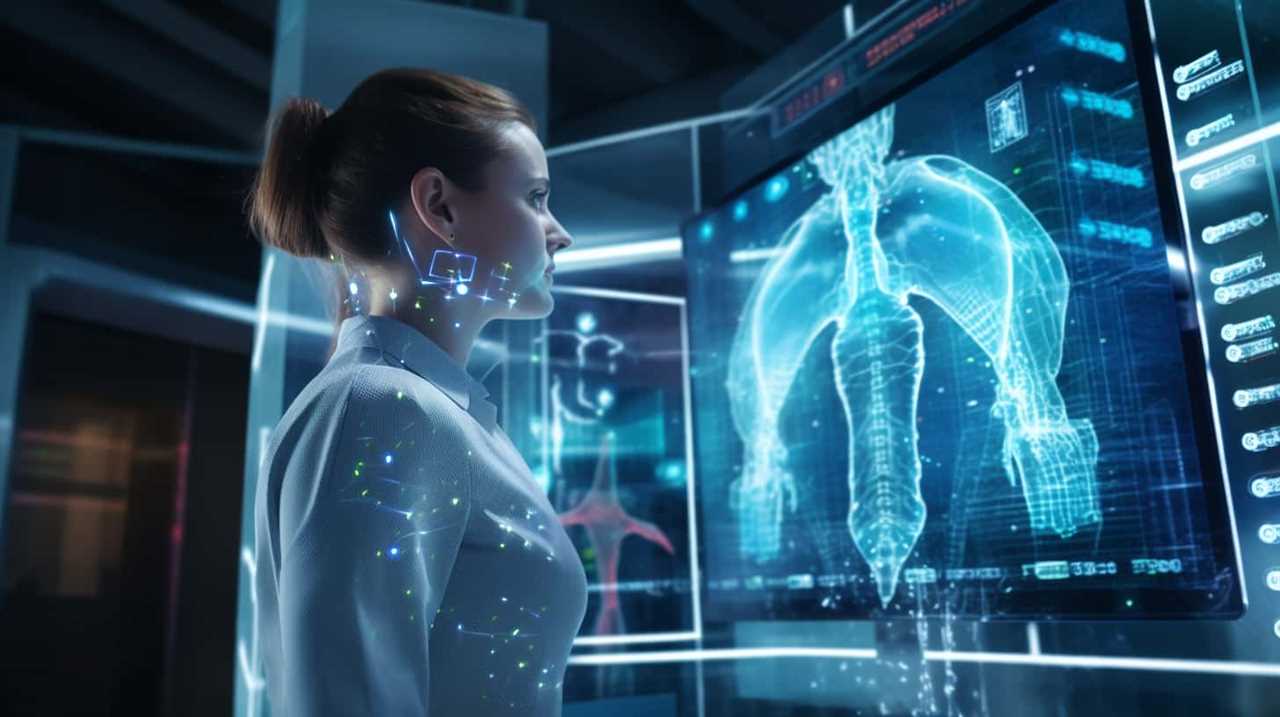Did you know that artificial intelligence (AI) is revolutionizing the healthcare industry, providing unanticipated benefits for both patients and healthcare providers?
AI has the potential to improve patient care and outcomes, enhance diagnostic accuracy and speed, streamline administrative processes, and enable personalized treatment plans.
With AI, healthcare resource management becomes more efficient, allowing for better allocation of resources.
In this article, we will explore the remarkable ways in which AI is transforming the healthcare industry and discuss the implications for the future.

Key Takeaways
- AI enables proactive identification of potential health issues
- AI analyzes vast amounts of medical data and aids in detecting diseases at an early stage
- AI streamlines administrative processes such as scheduling, billing, and record keeping
- AI analyzes patient data to develop personalized treatment plans and optimize healthcare resource management
Improved Patient Care and Outcomes
One of the key benefits of AI in healthcare is its ability to significantly improve patient care and outcomes. Through the implementation of remote monitoring and predictive analytics, AI enables healthcare providers to proactively identify potential health issues and intervene before they escalate.
Remote monitoring allows healthcare professionals to continuously monitor patients’ vital signs and track their progress from a distance. This not only reduces the need for frequent hospital visits but also provides patients with the convenience of receiving care in the comfort of their own homes.
Additionally, predictive analytics leverages AI algorithms to analyze vast amounts of patient data, identifying patterns and trends that can help predict disease progression or response to treatment. This enables healthcare providers to personalize care plans, optimize treatment strategies, and ultimately improve patient outcomes.
The integration of AI in healthcare is revolutionizing patient care by enhancing monitoring capabilities and delivering more precise and personalized care.

Enhanced Diagnostic Accuracy and Speed
We can greatly improve diagnostic accuracy and speed in healthcare with the implementation of AI technology. By harnessing the power of machine learning algorithms, AI systems can analyze vast amounts of medical data and provide valuable insights to healthcare professionals.
This increased efficiency allows for faster and more accurate diagnosis, leading to improved patient outcomes. AI can identify patterns and anomalies in medical images, such as X-rays or MRIs, aiding radiologists in detecting diseases at an early stage. AI-powered diagnostic tools can also assist in interpreting laboratory test results, reducing errors caused by human oversight or fatigue.
Additionally, AI algorithms can analyze patient symptoms, medical history, and genetic information to suggest personalized treatment plans, further enhancing diagnostic accuracy. With AI, healthcare providers can deliver more precise and timely diagnoses, ultimately improving patient care and reducing healthcare costs.
Streamlined Administrative Processes
By implementing AI technology, healthcare organizations can streamline administrative processes and improve efficiency in managing tasks such as scheduling, billing, and record keeping. Automated scheduling systems powered by AI algorithms can optimize appointment slots, reducing wait times and ensuring that healthcare providers can maximize their time with patients. Additionally, AI can analyze vast amounts of data to identify patterns and trends in billing and record keeping, helping to identify errors or discrepancies that may have otherwise gone unnoticed. This not only improves accuracy but also saves time for administrative staff. The following table highlights the benefits of AI in streamlining administrative processes:

| Benefits of AI in Streamlining Administrative Processes |
|---|
| Automated scheduling optimizes appointment slots |
| Data analysis identifies errors and discrepancies |
| Increased efficiency in managing tasks |
| Enhanced accuracy in billing and record keeping |
| Reduction in administrative workload |
Streamlining administrative processes through AI technology sets the stage for the subsequent section on personalized treatment plans and precision medicine.
Personalized Treatment Plans and Precision Medicine
To develop personalized treatment plans and advance precision medicine, AI technology plays a crucial role in analyzing patient data and identifying tailored healthcare solutions.
By leveraging AI algorithms, healthcare providers can perform genomic analysis to gain insights into an individual’s unique genetic makeup. This information allows for a deeper understanding of the patient’s susceptibility to certain diseases and their response to different treatments.
With this knowledge, AI can help in the identification of targeted therapies that are specifically designed to address the patient’s genetic profile. By analyzing vast amounts of data from diverse sources, AI systems can quickly identify patterns and correlations that may not be readily apparent to human clinicians.

This enables healthcare professionals to develop personalized treatment plans that are more effective and efficient, leading to improved patient outcomes.
Efficient Healthcare Resource Management
With AI, we can streamline the management of healthcare resources through efficient utilization and optimization. AI algorithms can analyze vast amounts of data to identify areas of improvement and cost optimization in resource allocation. By analyzing patient data, AI can determine the most effective use of resources, such as hospital beds, medical equipment, and staff scheduling. This ensures that resources are allocated where they’re most needed, reducing waste and improving patient care.
Additionally, AI can help in predicting demand for healthcare services, allowing for better planning and resource allocation. However, it’s crucial to address concerns regarding data security when implementing AI in healthcare resource management. Robust security measures need to be in place to protect patient information and maintain privacy.
Frequently Asked Questions
How Can AI Improve Patient Care and Outcomes in Healthcare?
AI can improve patient care and outcomes in healthcare by enhancing remote patient monitoring. It allows for continuous monitoring of vital signs, early detection of abnormalities, and timely interventions, resulting in improved patient experience and better health outcomes.

What Are the Benefits of Enhanced Diagnostic Accuracy and Speed Through AI in Healthcare?
Enhanced diagnostic accuracy and speed through AI in healthcare revolutionize patient outcomes. AI-driven healthcare improves accuracy by analyzing vast amounts of data, leading to faster and more precise diagnoses, ultimately benefiting patients.
How Does AI Streamline Administrative Processes in the Healthcare Industry?
Improving efficiency and reducing costs, AI streamlines administrative processes in healthcare. By automating tasks like appointment scheduling, billing, and record-keeping, AI enables healthcare professionals to focus more on patient care.
How Does AI Contribute to Personalized Treatment Plans and Precision Medicine?
AI contributes to personalized treatment plans and precision medicine by analyzing vast amounts of patient data, identifying patterns, and generating insights. This leads to improved patient outcomes and the development of AI-driven therapies tailored to individual needs.
In What Ways Can AI Help With Efficient Healthcare Resource Management?
AI driven scheduling and predictive analytics can greatly assist with efficient healthcare resource management. By analyzing data and patterns, AI can optimize resource allocation, improve patient flow, and reduce wait times, ultimately enhancing overall healthcare efficiency.

Conclusion
In conclusion, the revolutionary impact of AI in healthcare is akin to a gentle breeze that has transformed into a powerful gust, sweeping away the barriers that once hindered progress.
With improved patient care, enhanced diagnostic accuracy, streamlined administrative processes, and personalized treatment plans, AI has become the beacon of hope in the realm of healthcare.
Its ability to efficiently manage resources ensures a brighter future, where precision medicine becomes the norm.
Embrace the winds of change, for AI is the catalyst that will revolutionize healthcare.










